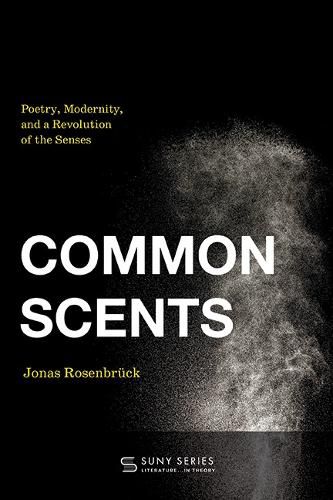Readings Newsletter
Become a Readings Member to make your shopping experience even easier.
Sign in or sign up for free!
You’re not far away from qualifying for FREE standard shipping within Australia
You’ve qualified for FREE standard shipping within Australia
The cart is loading…






Attends to the much-neglected sense of smell in and around modern poetry to suggest the possibility of a revolution of the senses.
The sense of smell has long been the most neglected of the human senses in literature. Common Scents sets out to undo this forgetting of olfactory sense-making by tracing the appearance of odors in modern German and French poetry. Jonas Rosenbrueck argues that smell's persistence undermines modernity's self-image as an ocular age and shows how scents index a veritable "revolution of the senses." Such a revolution, as a redistribution of the senses, would make the common and shared character of our existence in scented atmospheres perceptible.
Bringing contemporary ecocritical interest in atmospheres, air, and the senses into dialogue with literary criticism, theories of modernity, and political philosophy, Common Scents provides novel interpretations of figures such as Friedrich Hoelderlin, Charles Baudelaire, Friedrich Nietzsche, and Bertolt Brecht. These readings demonstrate how all terrestrial life is interlinked in the aerial commons that escapes the privatizing grasp of what Karl Marx called the "sense of having." Reformulating Bruno Latour, Rosenbrueck argues that we have never been deodorized. In attending to this fact, Common Scents reconfigures subjectivity, corporeality, and politics.
$9.00 standard shipping within Australia
FREE standard shipping within Australia for orders over $100.00
Express & International shipping calculated at checkout
Attends to the much-neglected sense of smell in and around modern poetry to suggest the possibility of a revolution of the senses.
The sense of smell has long been the most neglected of the human senses in literature. Common Scents sets out to undo this forgetting of olfactory sense-making by tracing the appearance of odors in modern German and French poetry. Jonas Rosenbrueck argues that smell's persistence undermines modernity's self-image as an ocular age and shows how scents index a veritable "revolution of the senses." Such a revolution, as a redistribution of the senses, would make the common and shared character of our existence in scented atmospheres perceptible.
Bringing contemporary ecocritical interest in atmospheres, air, and the senses into dialogue with literary criticism, theories of modernity, and political philosophy, Common Scents provides novel interpretations of figures such as Friedrich Hoelderlin, Charles Baudelaire, Friedrich Nietzsche, and Bertolt Brecht. These readings demonstrate how all terrestrial life is interlinked in the aerial commons that escapes the privatizing grasp of what Karl Marx called the "sense of having." Reformulating Bruno Latour, Rosenbrueck argues that we have never been deodorized. In attending to this fact, Common Scents reconfigures subjectivity, corporeality, and politics.